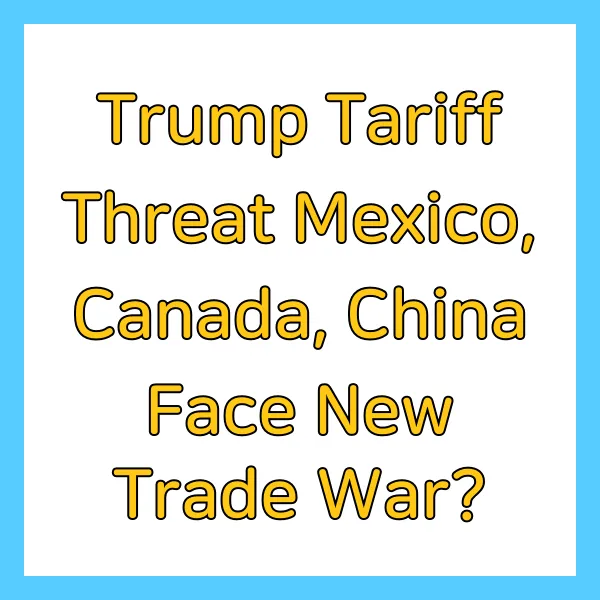
Former President Trump's renewed tariff threats against Mexico, Canada, and China have sent ripples of anxiety through the global trade ecosystem. Will these protectionist policies spark a new trade war, disrupting global supply chains and impacting economies worldwide? This in-depth analysis examines the potential ramifications of these proposed tariffs, exploring the specific targets, the rationale behind them, and the potential consequences for all stakeholders involved.
Trump's Tariff Threats: A Breakdown

Trump's recent pronouncements signal a potential resurgence of his aggressive trade tactics, targeting three of the United States' most significant trading partners: Mexico, Canada, and China . Let's dissect these threats:
Tariffs on Mexico and Canada: A Narcotics and Immigration Issue?
Trump's proposed 25% tariff on goods from Mexico and Canada, ostensibly aimed at curbing drug trafficking and illegal immigration, has raised eyebrows. This move links trade policy directly to domestic security concerns, a strategy with potential ramifications far beyond economics. The tight deadline of March 4th for implementation adds further pressure. Canada's preemptive "Operation Blizzard" aimed at addressing drug trafficking underscores the seriousness of the situation. However, its effectiveness in averting tariffs remains uncertain. Canada's potential retaliatory tariffs on US goods, including ceramic products, steel, furniture, alcohol, orange juice, pet food, and potentially even energy, could significantly impact US industries.
Tariffs on China: Fanning the Flames of a Trade War
The proposed additional 10% tariff on Chinese imports further escalates the existing trade war between the two economic powerhouses. This, coupled with the existing 10% tariff, paints a grim picture for global supply chains and consumer prices. China's history of retaliatory tariffs (10-15% on US goods in response to previous tariffs) suggests a likely tit-for-tat escalation, potentially spiraling into a full-blown trade war . The synchronized March 4th effective date for both the Mexico/Canada and China tariffs amplifies the potential for widespread economic disruption.
Global Economic Impact: Bracing for the Storm

The economic fallout from these proposed tariffs could be substantial, impacting consumers, businesses, and global markets alike.
Consumer Impact: Feeling the Pinch
Higher tariffs inevitably lead to increased prices for consumers across a vast spectrum of goods. From everyday groceries to big-ticket items like cars and electronics, everything could become more expensive. This could erode consumer purchasing power, fuel inflation, and ultimately dampen economic growth. Ouch!
Business Impact: Navigating Uncertain Waters
Businesses, especially those reliant on intricate global supply chains, face a daunting challenge. Higher input costs, squeezed profit margins, and potential operational disruptions loom large. The automotive industry, a cornerstone of North American trade, is particularly vulnerable to disruptions in cross-border commerce.
Market Reaction: A Canary in the Coal Mine?
The stock market's negative reaction to the tariff announcements (Dow Jones down 0.45%, S&P 500 down 1.59%, Nasdaq down 2.78%) serves as a stark warning. Investor concern about the potential economic fallout is palpable. The varying impact across different indices highlights specific sector vulnerabilities. This isn't looking good!
The Specter of Retaliation: A Vicious Cycle

Retaliatory tariffs from Mexico, Canada, and China are virtually guaranteed. These nations are unlikely to passively absorb the blow of punitive tariffs without responding in kind. Retaliation could manifest in various ways, including tariffs on US goods, investment restrictions, and other trade barriers. This could ignite a vicious cycle of protectionist measures, harming all parties involved.
"Reciprocal Tariffs": Widening the Trade War Front?

Trump's planned April 2nd announcement of "reciprocal tariffs" on various countries, aimed at "balancing trade" and addressing perceived unfairness in existing tariffs, broadens the scope of the trade war. This signals a wider trade strategy beyond the immediate focus on Mexico, Canada, and China. The example of targeting Canada's 5% national sales tax illustrates the potential scope and targets of these additional tariffs.
The Future of Global Trade: At a Crossroads

Trump's actions challenge the established rules-based trading system that has fueled global economic growth for decades. A resurgence of protectionism could unravel the progress made in reducing trade barriers and fostering international cooperation, leading to a fragmented and less prosperous global economy. The timing of these threats, amidst a global economy already grappling with the lingering effects of the COVID-19 pandemic, supply chain bottlenecks, and geopolitical instability, is particularly concerning. Adding a trade war to this volatile mix could further destabilize the global economy. Is this really the path we want to take?!
Conclusion: The Need for Cooperation

The potential for a renewed trade war carries significant risks. Escalating tensions, retaliatory tariffs, and widespread economic disruption are all too real possibilities. Businesses, governments, and international organizations must prioritize de-escalation, fostering dialogue, and upholding the principles of free and fair trade. The stakes are incredibly high, and the potential consequences of a trade war are dire. The global economy is on tenterhooks, waiting to see how this situation unfolds. The path forward demands a commitment to cooperation and a recognition that trade wars ultimately benefit no one. The future of global trade, and indeed the global economy, hangs in the balance. Let's hope cooler heads prevail.
'NEWS' 카테고리의 다른 글
| Gregg Popovich Won't Return to Spurs (0) | 2025.03.01 |
|---|---|
| Severance Dethrones Ted Lasso as Apple TV+'s Most Watched Show (0) | 2025.03.01 |
| Mr.Beast Seeks $5 Billion Valuation in New Funding Round (0) | 2025.03.01 |
| Tokyo's 4-Day Workweek Will it Solve the Population Crisis? (0) | 2025.02.28 |
| Jeffrey Epstein Files Released What's Inside? (0) | 2025.02.28 |